Top Sunni Cleric Warns About Execution Of Iranian Protesters
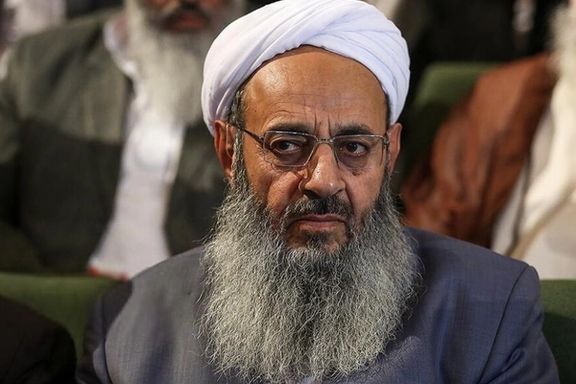
Leading Iranian Sunni cleric Mowlavi Abdolhamid has once again warned about the consequences of executions and suppression of protesters in Iran.

Leading Iranian Sunni cleric Mowlavi Abdolhamid has once again warned about the consequences of executions and suppression of protesters in Iran.
In a tweet on Monday, Abdolhamid, the religious leader of Iran’s largely Sunni Baluch population, asked the authorities of the Islamic Republic to listen to the voice of the protesters.
His comments came after the Iranian regime hanged a second protester, Majidreza Rahnavard in less than a week in public on Monday after charging him with killing two members of security forces.
“Arbitrary executions and repression have no result other than God’s displeasure, public hatred, and igniting the nation’s anger,” reads his tweet.
He further asked the government to “see the facts and hear the voice of the people.”
During his trial, Majidreza Rahnavard was denied the right to choose a lawyer, and his execution was carried out only 23 days after his arrest, which has raised many questions about the trial process and judicial justice.
Abdolhamid had previously said in reaction to the execution of Mohsen Shekari, who was the first protester hanged by the regime December 8, “it is not correct from the viewpoint of the Quran and Sharia to execute a person who did not kill anyone and only blocked the road and used a knife.”
Mohsen Shekari, the 23-year-old protester was only accused by the judiciary of blocking a street and injuring a Basij militia.

People took to the street in Iranian cities Monday evening chanting slogans or quietly marching in protest to the execution of a second protester in the morning.
A video taken in Mashhad, the hometown of the twenty-three-year-old Majidreza Rahnavard who was executed in the early hours of Monday, shows a group of youth chanting “Why you are silent people? Iran has become Palestine!”.
Photos published of the “public execution” show the young man hanging from a construction crane in the dusk while masked security forces and tens of others stand around. The body was left hanging until after sunrise.
Spectators of the “public execution” were apparently handpicked members of the security forces and judiciary officials as the public and even the family had been kept in the dark about the decision to execute him.
Authorities allowed Rahnavard’s mother a visit to prison Sunday evening without telling the family their loved one was going to be executed the next morning. The two even took several photos together in which both, apparently falsely believing that the death sentence had been dropped, appear with smiles on their faces.
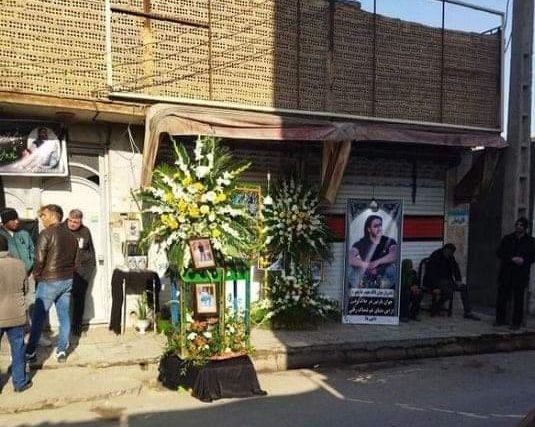
Photos posted on social media show the bereaved family have decorated their door with colorful lights and put a large photo of him. They also erected a domed structure known as hijla (bridal chamber) in front of their house, also decorated with lights and flowers as tradition dictates when a young man dies before having wed.
There are also photos and videos of Rahnavard’s grave, where security forces buried him before informing the family of the execution. “Martyred for the homeland”, one of women present at the grave chants. In another video people are heard wailing and chanting “Khamenei is a murderer, his [religious] authority is not legitimate!”.
Iran's judiciary claims that Rahnavard attacked several “protectors of security”, apparently two Basij members and plainclothesmen, without provocation and stabbed two of them to death. Some people, however, have claimed on social media that the young man took part in several protests and had used the knife to defend his younger sister who was harassed for her ‘bad’ hijab by several of the Basij militiamen and plainclothesmen on the street near his home on the day of the incident.
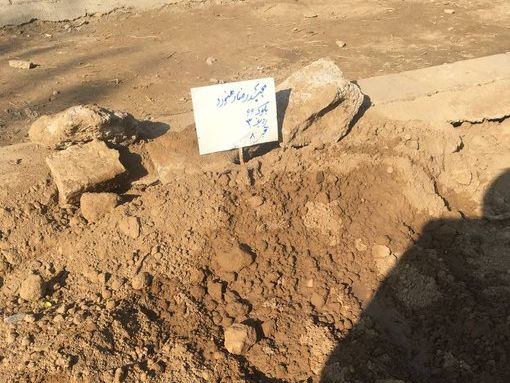
There are few videos of protests Monday evening, apparently for the reason that people are leaving their mobile phones home for security, but a video posted on Twitter shows protesters chanting against the Revolutionary Guards (IRGC) and its Basij paramilitary force in Shiraz, capital of Fars Province. Another video shows people silently marching in Karaj, capital of Alborz Province to the west of Tehran.
In several neighborhoods of the capital, including Haft Howz in the east of the capital and Sattar Khan, and in Rasht, capital of the northern province of Gilan, people protested on the streets, chanting slogans such as “Down with the Dictator”, “Last message! We will rise up if you execute!”, and “You took away Majidreza and brought back his lifeless body!”
A video posted on Twitter shows that in Sattar Khan avenue protesters who had gathered outside the house of Mohsen Shekari, who was the first to be executed four days ago, clashed with security forces, chanting “Rascals, Rascals” at them.
Some people chose to express their anger in yet other ways. A woman in Tehran protested by holding placards telling the government “Don’t execute” at a metro station. Another woman at a metro station held a placard which urged people to “wake up” and protest to executions to put an end to “gallows”.
Protesters said on Twitter that security forces were using tear gas to disperse people as soon as more than a handful gathered, even quietly. Others reported that internet is very slow or completely down, to prevent uploading videos.
“There was a good crowd where we were in Haft Howz [in the east of Tehran], walking and pretending to be shopping, but they started shooting at us with paint markers and pepper sprayed us. My father is a war veteran and was badly affected by it,” a protester tweeted.
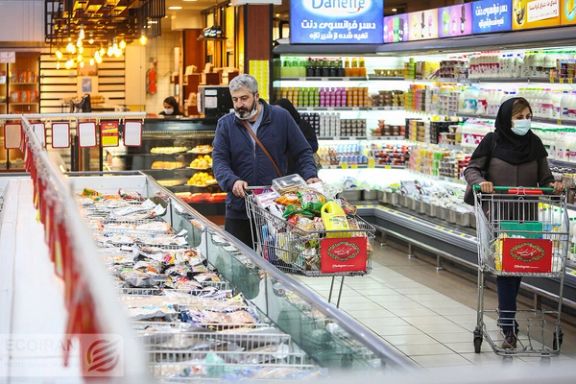
A man has put his sneakers on sale in exchange for meat, and another is ready to barter his books for rice; this is how Iranians are dealing with rising food prices.
A report published by Shargh newspaper on Sunday has given several such examples of personal ads put on online sale platforms by Iranians who have resorted to selling their personal belongings to be able to provide food for their families.
The article said that the high rate of inflation and the resulting poverty has led to the new phenomenon, in which more and more people have resorted to exchanging their household and personal items for food.
According to the report, Iranian online sale platforms are full of ads by people who want to exchange their clothes, shoes, vacuum cleaners, and heaters with chicken, oil, rice or beans. For example, in one case a shirt is priced at about 2,600,000 rials – or less than $8 – which can buy about one kilogram of meat or about four kilograms of chicken.
The report also said that fruit prices have increased so much that people have started to buy fruits one piece at a time although Iranians were used to buying fruits in kilos when the prices were lower.
Iran’s point-to-point inflation for the previous Iranian calendar month – which ended November 21 – was about 50 percent with food inflation recorded at above 70 percent in 12 provinces.
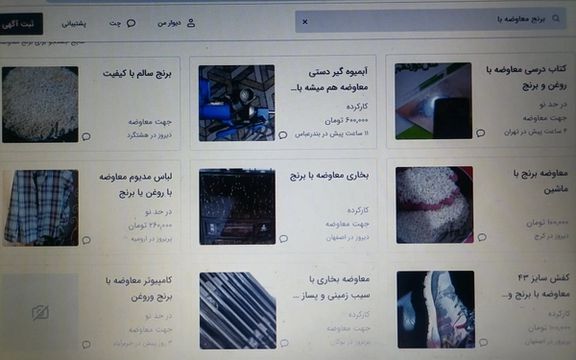
The inflation rate for food items was especially high in the province of Sistan-Baluchestan, reaching a whopping 84 percent, with Lorestan province hitting 78 percent to be at second place. The two provinces are low-income regions where the quality of the items they consume are also lower than in other provinces.
The figures indicated a slower rise in prices as food price inflation reached even 100 percent in some provinces in previous months. According to the data published by the Statistical Center of Iran (SCI) in late July, the overall nationwide point-to-point annual food inflation rate in June 2022 compared with the same period in 2021 was 87 percent, but in four provinces the rate reached almost 100 percent.
Most price increases happened since early May when the government scrapped a food import subsidy to save around $15 billion annually. The move immediately triggered a massive rise in prices for basic food staples, such as bread, dairy products, cooking oil and meat.
Although the government has repeatedly said its oil exports are steadily increasing despite sanctions by the United States, economic conditions keep deteriorating, with Iran's battered currency, the rial, hitting historic lows in recent months with sporadic recuperations. The battered rial has dropped to a low of 370,000 against the US dollar, an almost 50-percent decline in 15 months. It was trading at 280,000 in August 2021 when the current hardliner president Ebrahim Raisi was elected.
The Iranian currency began to lose most of its value in 2018 when the United States pulled out of the nuclear accord known as JCPOA and imposed crippling economic sanctions. Since then, the currency has fallen more than tenfold against the dollar. Although the Islamic Republic has been able to partly circumvent the sanctions by illicit oil exports to China at discounted prices, the volume of around one million barrels per day is not sufficient to sustain the economy, which is mostly dependent on oil export revenues.
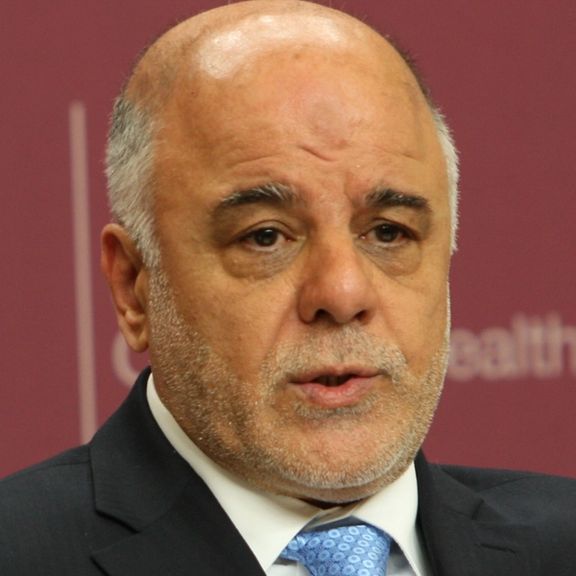
Former Iraqi Prime Minister says the operation to liberate Iraq from ISIS was planned and carried out by Iraqi fighters and not by any foreign ground forces.
In a tweet on Saturday on the fifth anniversary of the fall of ISIS, former Iraqi Premier Haider Al-Abadi said no foreign ground forces were involved in liberating Iraq from the terrorist group.
This comes as the Islamic Republic in recent years attributed the defeat of ISIS to the Revolutionary Guards (IRGC) Qods Force Commander Qassem Soleimani.
Soleimani, who was killed in a targeted US drone strike as he arrived in Baghdad airport on January 3, 2020, announced the end of ISIS in Iraq and Syria in a message to Supreme Leader Ali Khamenei on November 21, 2017.
In his message, Soleimani hailed the role of the Islamic Republic, especially the president, parliament, ministry of defense, and armed and security organizations in supporting the governments and nations of Iraq and Syria.
In response, Khamenei said “you have served not only the countries of the region and the Muslim world, but also all nations by defeating ISIS.”
In response to rapid territorial gains made by the ISIS during the first half of 2014, many states began to intervene against the terrorist group in both the Syrian and Iraq.
US Special Operations Command announced in February 2017 that their military efforts had resulted in the deaths of more than 60,000 Islamic State militants over the course of a two-year campaign. US advisors and air power played a critical role in defeating the jihadist group.
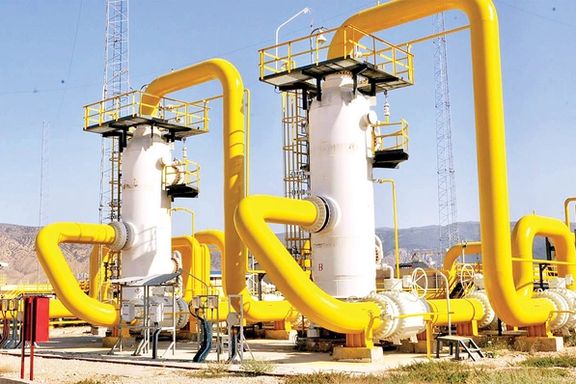
A couple of industrial units in Iran say they have received warnings to lower their natural gas consumption otherwise their ration would be cut off.
ILNA news website reported Monday that Iran’s Oil Ministry has released the list of petrochemical units that must stop or reduce their gas consumption. In this letter, petrochemicals producers in Masjid-i Suleiman, Zagros, Shiraz, Bandar Imam, and several others must reduce their consumption.
However, people on social media report some petrochemical industries have already stopped production due to the gas cuts.
Lowering gas consumption means a decrease in petrochemical production, while with a decrease in oil sales, the country is in dire need of foreign currency from petrochemical exports.
The government claims it has no plans to cut off gas from household and instead has reduced gas deliveries to the industrial sector due to its inability to extract enough gas.
Jafar Qadri, a lawmaker, has told ILNA the gas production at Parsian Refinery in southern Fars province has decreased from 80 million cubic meters to 50 million per day, adding that some platforms in South Pars have also faced dire problems.
With cold weather gripping Iran in recent days and a surge in demand, shortages of natural gas have become acute.
Iran has the second largest reserves of natural gas in the world but is barely able to satisfy domestic demand as production steadily declines because of lack of investments in the oil and gas sector.

Criticisms continue in Iran over China’s endorsement of a territorial claim by the UAE, as a top politician Sunday called Beijing’s action “humiliating”.
The former chief of the Iranian parliament's foreign policy and national security committee Hesmatollah Falahatpished called Iran's subdued reaction to China's suggestion that Tehran should negotiate the ownership of three Persian Gulf islands with Abu Dhabi as humiliating.
Meanwhile, China's endorsement of the December 9 GCC statement appears to have torpedoed Supreme Leader Ali Khamenei's much-heralded policy pf “Looking East.”
In his interview with Didban Iran website, Falahatpisheh accused those in charge of Iran's foreign policy of having illusions about strategic ties with China. He was obliquely pointing at Supreme Leader Ali Khamenei, the architect of Iran's "Looking East" policy since 2018, that called for relying on China and Russia in defying the United States.
Earlier, Khamenei had called China "an independent and trustworthy" partner and had urged expanding Iran's ties with Beijing during a meeting with Chinese President Xi Jinping in January 2016.
Falahatp[isheh also recalled that that Russians have sacrificed Iranian forces in Syria by putting them in the frontline of the military campaign to keep Bashar Assad in power. He said: In a world where countries maintain relations based on mutual interests, we see that the number of Iran's enemies in the world are on the rise.
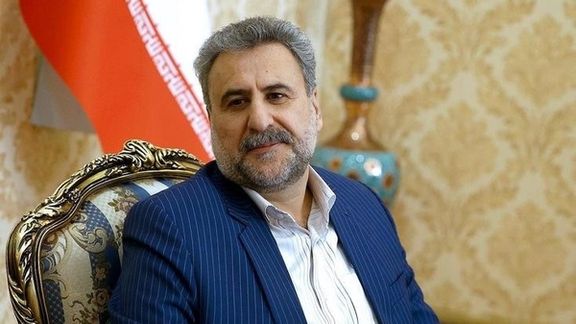
The conservative politician said China's action has been a political shock because a partner signed on a statement undermining Iran's territorial integrity. Falahatpisheh suggested that Tehran should change its policy toward Beijing.
He also criticized Iranian officials for not officially summoning China's ambassador in Tehran. Foreign Ministry officials in Tehran said they had a "meeting" with Beijing's ambassador and told him that Iran is not pleased with what China did. This was so humiliating, Falahatpisheh said.
He reminded Iranian diplomats that China and Russia basically do not believe in strategic relations with a country like Iran, which is weak and isolated.
Meanwhile, in an interview with Rouydad24 website in Tehran, Mehdi Motaharnia, a lecturer on international relations, said Iran was counting on China, but China's behavior showed what matters for other countries is their national interest rather than fixated ideologies. He added: In politics, there are no permanent friends or enemies.
Motaharnia argued that China's behavior should not surprise anyone. What has surprised Iranians is that they were heavily under the influence of their government's propaganda about having a strategic alliance with China. But that propaganda based on wishful thinking was meant to strike a balance in foreign policy to fill the void after the US withdrew from the 2015 nuclear deal.
While Iran continues its “permanent” confrontation with the United States, it wishes to pretend that it has big allies such as Russia and China that prevent its international isolation, Motaharnia said, adding that neither Russia nor China see Iran as a strategic partner. It is Iran that believes it can be a strategic market for those countries.
"This is wrong," said Motaharnia, adding that "It is Iran's wrong perception of international relations that agitates the public opinion in Iran. China is simply following its own interests in the region. So, it is looking for more stable countries to guarantee its profits. This is what pushes China toward Arab countries, particularly Saudi Arabia."
He added that "the tension resulting from the protests in Iran is also another factor that encourages China to reach out to Saudi Arabia, where it uses the term 'The Gulf' instead of Persian Gulf. Motaharnia charged that there is no realism in Iran's domestic and international policies and Tehran is paying the price for doing away with realism."